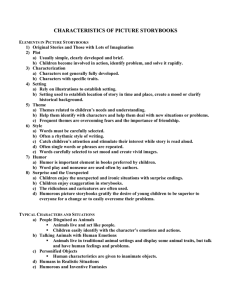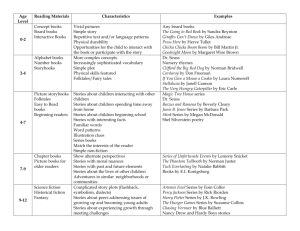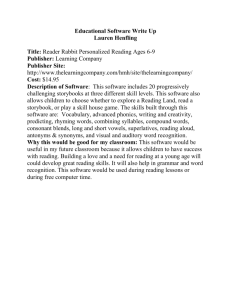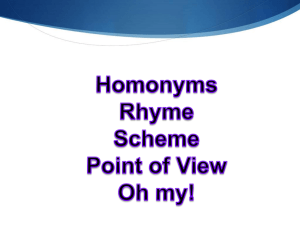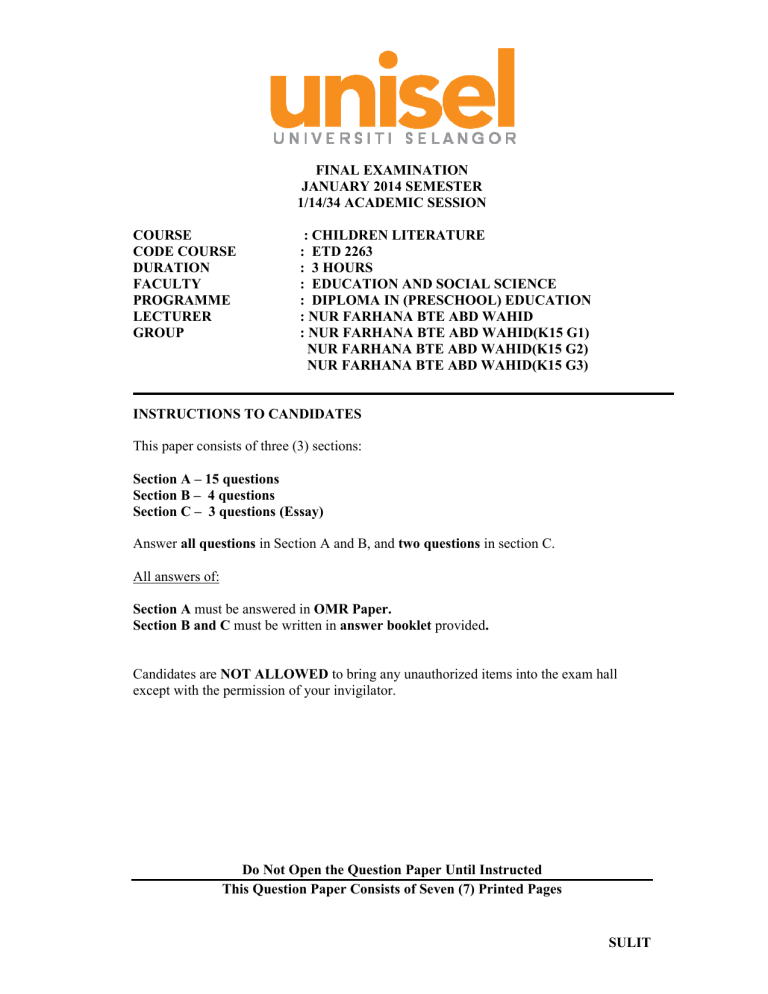
FINAL EXAMINATION JANUARY 2014 SEMESTER 1/14/34 ACADEMIC SESSION COURSE CODE COURSE DURATION FACULTY PROGRAMME LECTURER GROUP : CHILDREN LITERATURE : ETD 2263 : 3 HOURS : EDUCATION AND SOCIAL SCIENCE : DIPLOMA IN (PRESCHOOL) EDUCATION : NUR FARHANA BTE ABD WAHID : NUR FARHANA BTE ABD WAHID(K15 G1) NUR FARHANA BTE ABD WAHID(K15 G2) NUR FARHANA BTE ABD WAHID(K15 G3) INSTRUCTIONS TO CANDIDATES This paper consists of three (3) sections: Section A – 15 questions Section B – 4 questions Section C – 3 questions (Essay) Answer all questions in Section A and B, and two questions in section C. All answers of: Section A must be answered in OMR Paper. Section B and C must be written in answer booklet provided. Candidates are NOT ALLOWED to bring any unauthorized items into the exam hall except with the permission of your invigilator. Do Not Open the Question Paper Until Instructed This Question Paper Consists of Seven (7) Printed Pages SULIT FESS/ETD2263/JAN14 SECTION A (15 MARKS) Answer ALL questions. For each question choose the best answer. 1. The elements of Children Literature consists all of the above except: A. B. C. D. 2. “The most emotionally charged means of written expression and it consists of words arranged in patterns of sound and imagery to spark an emotional, and intellectual, response from us.” It in this statement best represent? A. B. C. D. 3. A picture of a cow An illustration of a cow A real cow A cartoon’s cow Which one is NOT an onomatopoiea? A. B. C. D. 5. Storybook Poetry Arts Song What is the example of ‘Realia’? A. B. C. D. 4. Storytelling Nursery Rhyme Dancing Arts Splash Splash Tick Tock Meow Meow Hahaha Why children can learn better with singing? A. B. C. D. They memorize the lyrics They are happy when singing with friends Singing creates an integration of mind and body Singing helps the children to be more focus CONFIDENTIAL/2 FESS/ETD2263/JAN14 6. What is the meaning of ‘Rhythm’? A. B. C. D. 7. What is the meaning of ‘Rhyme’? A. B. C. D. 8. B. C. D. Inappropriate for children's stories, placing the adult narrator in a superior position The author’s mood and manner of expression in a work of literature. The main, underlying idea of a piece of literature. A degree of sophistication that deconstructs the original story and depicts the characters from a different perspective All of the above are the normal types of conflicts except; A. B. C. D. 10. the repetition of vowel sounds within words the repetition of initial sounds in two or more words the repetition of similar sounds in the two or more words the pattern of stressed and unstressed syllables in language What is a ‘Parody’? A. 9. the repetition of vowel sounds within words the repetition of initial sounds in two or more words the repetition of similar sounds in the two or more words the pattern of stressed and unstressed syllables in language The Protagonist against Foil Character. The Protagonist against Society. The Protagonist against Nature. The Protagonist against Self. Which one is the teacher's responsibilities in effecting a successful reading experience to children? A. B. C. D. Do not tolerate Ask the children to read on their own Give them only few different types of literature Challenge them to explore those responses and learn something about themselves CONFIDENTIAL/3 FESS/ETD2263/JAN14 11. Zulaiqa is the main character in one story. Apart from that, she will sometimes narrate that story. What type of narrator is she? A. B. C. D. 12. Maimun is a narrator of one short story. She explains everything about the story from beginning until ending. But she is not even a character in the story. What type of narrator is she? A. B. C. D. 13. Illustration Picture Storybooks Easy-to-read Picture Storybooks Graphic Novel Picture Storybooks Picture Storybooks for Older Readers Picture storybooks B are long-form comic books, usually with lengthy and complex storylines, and often at more mature, serious audience. What is picture storybooks B? A. B. C. D. 15. Omniscient Narrator Parallel Narrator Limited Narrator Internal Narrator Picture storybooks A are meant to be read aloud. They have limited text on each page, large print, double spacing and short sentences. What is picture storybooks A? A. B. C. D. 14. Omniscient Narrator Parallel Narrator Limited Narrator Internal Narrator Illustration Picture Storybooks Easy-to-read Picture Storybooks Graphic Novel Picture Storybooks Picture Storybooks for Older Readers Picture storybooks C are generally more sophisticated, abstract, or complex in themes, stories and illustrations. This type of picture books began to appear in the 1970s. What is picture storybooks C? A. B. C. D. Illustration Picture Storybooks Easy-to-read Picture Storybooks Graphic Novel Picture Storybooks Picture Storybooks for Older Readers CONFIDENTIAL/4 FESS/ETD2263/JAN14 SECTION B: (45 marks) Answer all questions. 1. 1. 2. 3. 4. 5. 6. 7. Match the following with the suitable example. A Rain, rain, go away! All the children want to play. B Twinkle twinkle little star How I wonder what you are Action Rhyme Hello or Goodbye Rhyme Song about Food C Rhyme about Numbers D 9. 10. Hi Mary! How are you? Fine, thanks. What about you? Rhyme Games E Songs of Imagination F Bedtime Rhyme G 8. Diddle, diddle dumpling, My son John, Went to bed With his trousers on Rhyme with Names H Themed Rhyme I Traditional Rhyme J 10 fingers, 10 toes, 2 eyes And a round nose One Two buckle my shoe Three Four shut the door Five Six pic up sticks One potato, two potatoes, three potatoes, four, Five potatoes, six potatoes, seven potatoes, more? If all the raindrops were gumdrops and lemondrops What kind of rain that will be Pizza Pizza Nothing Beats a Pizza Its my tummy’s favourite Mary had a little lamb Little lamb, Little lamb (10 marks) CONFIDENTIAL/5 FESS/ETD2263/JAN14 2. 3. 4. a) List all Elements of Literature. (4 marks) b) Explain any TWO (2) elements that you have listed. (8 marks) a) List all Type of Picture Books. (2 marks) b) Explain any THREE (3) type of Books that you have listed. (6 marks) a) List the objectives of reader-centered approach. (4 marks) b) Briefly explain any TWO (2) activities that you have listed. (6 marks) CONFIDENTIAL/6 FESS/ETD2263/JAN14 SECTION C: (40 marks) Choose any TWO (2) questions. 1. A rhyme, for young children, is a complete, short experience, which fits well with their limited attention span. It is like a compact story: it has a beginning and an end, and its own content. There are wide selection of rhymes to meet most needs. Explain each type of rhymes with their example and lyrics. (20 marks) 2. Successful storytelling can be achieved by observing few guidelines. List all the guidelines and give explanation for each. (20 marks) 3. Prepare a 30 minutes lesson with suitable activity to teach children Song or Nursery Rhyme. You need to provide step by step lesson and attach the activity and handout. You can use any theme as listed below: • • • • • Animal Food My House Celebrations Ambition (20 marks) END OF QUESTION PAPER CONFIDENTIAL/7
